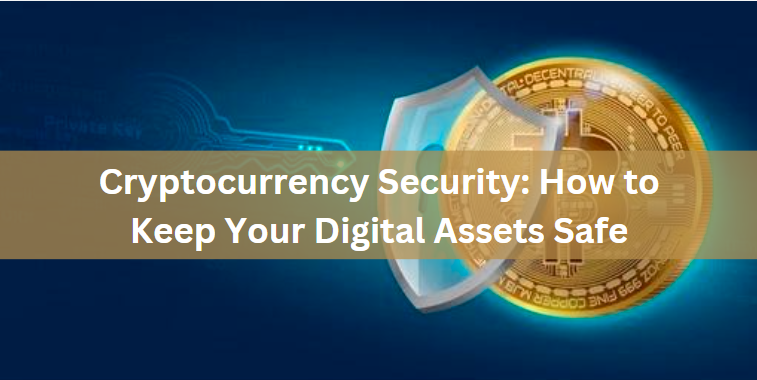Contents
- 1 Introduction
- 2 Understanding Cryptocurrency Security
- 3 Best Practices for Cryptocurrency Security
- 4 Advanced Security Measures
- 5 Keeping Up with Security Trends
- 6 Conclusion
Introduction
As the popularity of cryptocurrency continues to soar, so does the importance of securing your digital assets. Unlike traditional financial systems, where banks and institutions provide security, cryptocurrency ownership comes with the responsibility of safeguarding your own investments. This guide explores the essential measures and best practices to keep your cryptocurrency secure from potential threats.
Understanding Cryptocurrency Security
Why Security Matters
Cryptocurrencies are decentralized and pseudonymous, meaning transactions are transparent yet private. This dual nature, while offering numerous advantages, also attracts hackers and cybercriminals. Without adequate security measures, your digital assets are at risk of being stolen or compromised.
Common Threats
- Phishing Attacks: Fraudulent attempts to obtain sensitive information by pretending to be a trustworthy entity.
- Malware: Malicious software designed to steal private keys or other sensitive data.
- Exchange Hacks: Breaches of cryptocurrency exchanges resulting in the theft of users’ funds.
- Social Engineering: Manipulating individuals into divulging confidential information.
Best Practices for Cryptocurrency Security
1. Use Secure Wallets
Hardware Wallets
Hardware wallets are physical devices that store your private keys offline. They are considered one of the most secure ways to store cryptocurrencies.
- Ledger Nano S/X
- Trezor Model T
Software Wallets
Software wallets are applications installed on your computer or mobile device. While more convenient, they are also more susceptible to malware and hacking.
- Exodus
- Electrum
2. Enable Two-Factor Authentication (2FA)
Two-factor authentication adds an extra layer of security by requiring two forms of verification before accessing your accounts. Always enable 2FA on your cryptocurrency exchange accounts and wallets.
3. Keep Your Private Keys Secure
Your private keys are the most crucial component of your cryptocurrency security. Never share them with anyone and store them in a secure location, such as a hardware wallet or an encrypted digital file.
4. Use Strong Passwords
Create complex and unique passwords for your exchange accounts and wallets. Avoid using easily guessable information and consider using a password manager to keep track of your credentials.
5. Be Cautious with Public Wi-Fi
Avoid accessing your cryptocurrency accounts over public Wi-Fi networks, which are more vulnerable to hacking. Use a virtual private network (VPN) for an added layer of security when accessing your accounts from public networks.
6. Regularly Update Your Software
Ensure that your wallet software, antivirus programs, and operating systems are up to date. Software updates often include security patches that protect against new threats.
7. Backup Your Wallet
Regularly back up your wallet to ensure you can recover your funds in case of hardware failure or loss. Store backups in multiple secure locations, such as encrypted USB drives or paper wallets.
8. Be Aware of Phishing Scams
Be vigilant about phishing attempts. Always verify the authenticity of emails, messages, and websites before entering sensitive information. Bookmark official websites and avoid clicking on links from unsolicited messages.
Advanced Security Measures
Cold Storage
Cold storage involves keeping your private keys completely offline, such as in a hardware wallet or a paper wallet. This method is highly secure as it is immune to online hacking attempts.
Multi-Signature Wallets
Multi-signature wallets require multiple private keys to authorize a transaction, adding an extra layer of security. This setup can prevent unauthorized access even if one key is compromised.
Segregate Funds
Consider separating your funds into different wallets. For example, keep a small amount in a hot wallet for daily transactions and the majority in a cold wallet for long-term storage.
Keeping Up with Security Trends
Stay Informed
The cryptocurrency landscape is constantly evolving. Stay informed about the latest security threats and best practices by following reputable news sources, joining cryptocurrency communities, and subscribing to security-focused newsletters.
Use Reputable Exchanges
Choose reputable cryptocurrency exchanges known for their robust security measures. Research their security protocols, history of breaches, and user reviews before entrusting them with your funds.
Consider Insurance
Some exchanges and wallet providers offer insurance against theft or hacking. While this is not a replacement for robust security practices, it can provide an additional layer of protection.
Conclusion
Securing your cryptocurrency requires vigilance, knowledge, and proactive measures. By using secure wallets, enabling two-factor authentication, safeguarding your private keys, and staying informed about the latest security trends, you can significantly reduce the risk of losing your digital assets. Remember, the decentralized nature of cryptocurrencies places the responsibility of security on the individual, making it essential to prioritize and implement comprehensive security practices.




